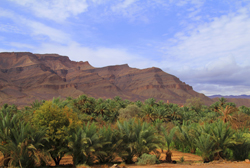Sustainable agriculture in arid regions
The EU-funded BIODESERT(opens in new window) project was successful in upgrading research infrastructure and technical know-how in molecular microbial ecology at the University of Tunis (UTUN), Tunisia. BIODESERT members recruited five experienced researchers for the Laboratory of Microorganisms and Active Biomolecules (LMBA) at UTUN. This laboratory has actively worked on developing processes and discovering microbes that improve soil water retention, fertility, plant resistance to pathogens and parasites. To increase technical know-how and research capacity, the recruited researchers and permanent staff at the LMBA were trained on modern techniques and technologies by two European laboratories in Greece and Italy. To conduct state-of-the-art research, nine advanced analytical equipment including the DNA Microarray system, Real Time-thermo cycler and Phenotypic Array System were acquired. This upgrade in infrastructure will support biotechnological research on microbial extremophiles from arid ecosystems to improve agricultural growth sustainably. Three sampling expeditions were carried out in the desert and pre-desert areas of the south of Tunisia to characterise microbes living in such conditions. Several dissemination activities at regional, national and international levels promoted knowledge about MRM strategies and the usefulness of microbe-based biotechnology in agriculture. Open days at the LMBA, four scientific seminars, three workshops, an international scientific conference, project leaflets, publications and the project website significantly increased the visibility of this project. BIODESERT activities supported research and technological development resulting in the publication of papers in peer-reviewed research journals. Some of the recruited post-doctoral researchers were offered permanent positions and permanent staff received recognition and promotion. A new research laboratory was created at the University of Manouba and was recognised as autonomous by the Ministry of Higher Education and Scientific Research. This also resulted in further research collaborations between the EU, North Africa and Tunisia. Ultimately, it is expected that microbially driven biotechnological approaches will increase quality and agricultural yield with minimal use of energy and water resources.



